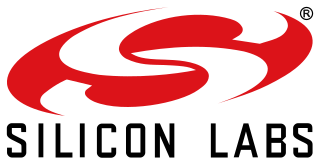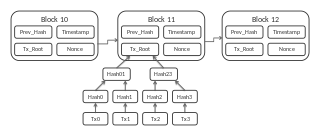Machine to machine (M2M) is direct communication between devices using any communications channel, including wired and wireless. Machine to machine communication can include industrial instrumentation, enabling a sensor or meter to communicate the information it records to application software that can use it. Such communication was originally accomplished by having a remote network of machines relay information back to a central hub for analysis, which would then be rerouted into a system like a personal computer.
Semtech Corporation is a supplier of analog and mixed-signal semiconductors and advanced algorithms for consumer, enterprise computing, communications and industrial end-markets. It is based in Camarillo, Ventura County, Southern California. It was founded in 1960 in Newbury Park, California. It has 32 locations in 15 countries in North America, Europe, and Asia.
The Internet of things (IoT) describes the network of physical objects, so known as, "things" — that are embedded with sensors, software, and other technologies that is used for the purpose of connecting and exchanging data with other devices and systems over the Internet.

Silicon Laboratories, Inc. is a fabless global technology company that designs and manufactures semiconductors, other silicon devices and software, which it sells to electronics design engineers and manufacturers in Internet of Things (IoT) infrastructure, industrial automation, consumer and automotive markets worldwide.

KORE Wireless Group makes Internet of Things systems. It is headquartered in Alpharetta, Georgia.

A blockchain is a growing list of records, called blocks, that are linked together using cryptography. Each block contains a cryptographic hash of the previous block, a timestamp, and transaction data. The timestamp proves that the transaction data existed when the block was published in order to get into its hash. As blocks each contain information about the block previous to it, they form a chain, with each additional block reinforcing the ones before it. Therefore, blockchains are resistant to modification of their data because once recorded, the data in any given block cannot be altered retroactively without altering all subsequent blocks.

Keepgo is a mobile broadband and IoT cellular service provider.
A low-power wide-area network (LPWAN) or low-power wide-area (LPWA) network or low-power network (LPN) is a type of wireless telecommunication wide area network designed to allow long-range communications at a low bit rate among things, such as sensors operated on a battery. The low power, low bit rate and intended use distinguish this type of network from a wireless WAN that is designed to connect users or businesses, and carry more data, using more power. The LPWAN data rate ranges from 0.3 kbit/s to 50 kbit/s per channel.
Senet Inc. is an American Low Power Wide Area Network (LPWAN) provider for IoT/M2M applications. The Senet Network is described as "the first and only public provider of LPWA networks with class leading LoRa® modulation for IoT/M2M applications in North America”. Its platform is positioned to meet the needs of the growing “Internet of Things” (IoT) ecosystem.
A decentralized application is a computer application that runs on a decentralized computing system.

LoRa is a proprietary low-power wide-area network modulation technique. It is based on spread-spectrum modulation techniques derived from chirp spread spectrum (CSS) technology. It was developed by Cycleo of Grenoble, France and acquired by Semtech, the founding member of the LoRa Alliance; it is patented.

IOTA is an open-source distributed ledger and cryptocurrency designed for the Internet of things (IoT). It uses a directed acyclic graph to store transactions on its ledger, motivated by a potentially higher scalability over blockchain based distributed ledgers. IOTA does not use miners to validate transactions, instead, nodes that issue a new transaction on the network must approve two previous transactions. Transactions can therefore be issued without fees, facilitating microtransactions. The network currently achieves consensus through a coordinator node, operated by the IOTA Foundation. As the coordinator is a single point of failure, the network is currently centralized.

Smart Parks is an organisation which focuses on supporting conservation and anti-poaching using modern technology.

TRON is a Blockchain with a cryptocurrency native to the system, known as TRX. Justin Sun founded the cryptocurrency in 2017.
Amazon Sidewalk is a low-bandwidth long-range wireless communication protocol developed by Amazon. It uses Bluetooth Low Energy (BLE) for short distance communication, and 900 MHz LoRa and other frequencies for longer distances.

Matter, formerly Project Connected Home over IP (CHIP), is a proprietary, royalty-free home automation connectivity standard. Announced on December 18th, 2019, Matter aims to reduce fragmentation across different vendors, and achieve interoperability among smart home devices and Internet of things (IoT) platforms from different providers. The project group was launched and introduced by Amazon, Apple, Google, Comcast and the Zigbee Alliance, now Connectivity Standards Alliance (CSA). Subsequent members include IKEA, Huawei, Schneider, among others. Matter-compatible products and software updates for existing products are expected to release in 2021. Although the Matter code repository is open-source under the Apache license, the Matter specification is licensed by CSA.
Static Context Header Compression(SCHC) is a standard compression and fragmentation mechanism defined in the IPv6 over LPWAN working group at the IETF. It offers compression and fragmentation of IPv6/UDP/CoAP packets to allow their transmission over the Low-Power Wide-Area Networks (LPWAN).
hoopo is an energy efficient tracking system that helps companies and institutions to manage airport ground support equipment, supply chain, waste management and transportation logistics using low power wide area networks (LPWA). It was founded in 2016 and is headquartered in Tel Aviv, Israel, with operations in the USA, Europe, and Japan.
Algorand is a blockchain-based cryptocurrency platform that aims to be secure, scalable, and decentralized. The Algorand platform supports smart contract functionality, and its consensus algorithm is based on proof-of-stake principles and a Byzantine Agreement protocol. Algorand's native cryptocurrency is called Algo.
Lightweight Blockchain is a modified blockchain with simplified algorithm without sacrificing data security. This type of blockchain is suitable for applications that need for data reliability but limited computational resources like Internet of Things (IoT) and Autonomous Driving. Especially in IoT, most of the connected devices are small, ubiquitous, and running on battery but aimed to work for a long period of time remotely and securely. Lightweight blockchain enabled trust evaluation mechanism in wireless sensor network for secured data transaction between nodes.







